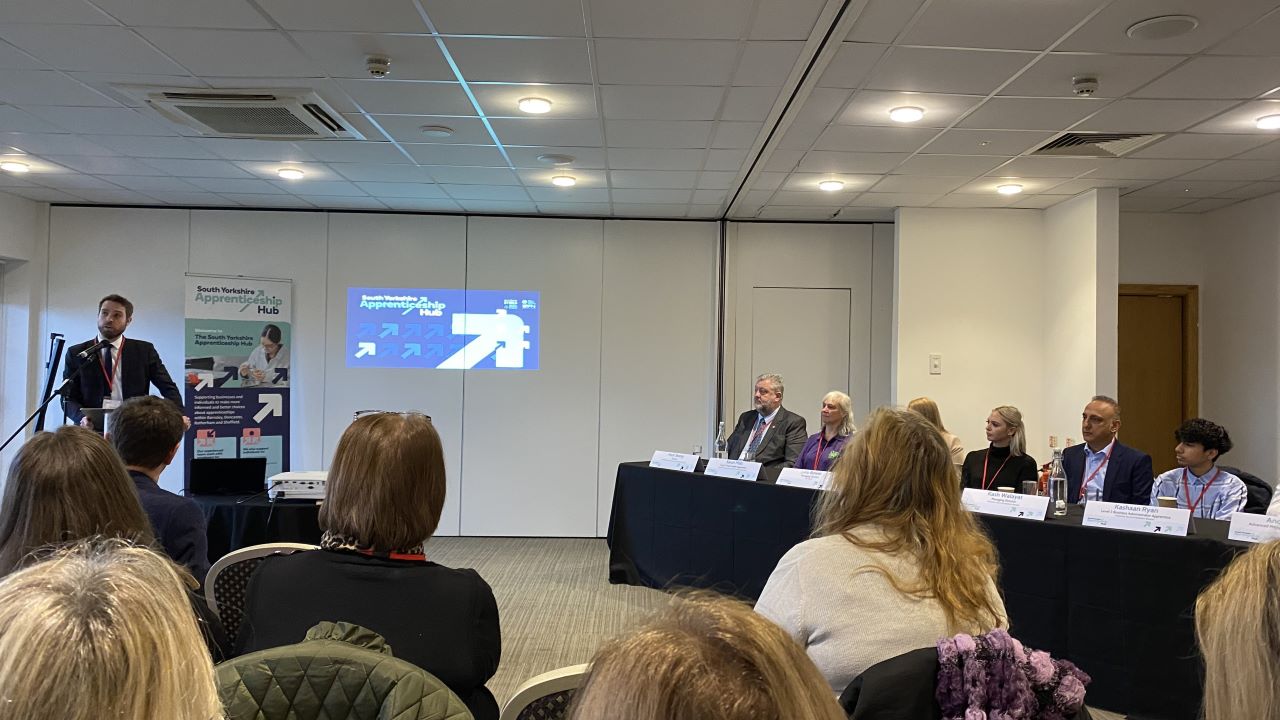South Yorkshire Apprenticeship Hub launches

On Tuesday, 5 December, The South Yorkshire Apprenticeship Hub officially launched to help businesses and individuals make more informed and better choices about apprenticeships within the region. An event was held at AESSEAL’s New York Stadium in Rotherham to mark the occasion.
Based at the South Yorkshire Mayoral Combined Authority (SYMCA) in Sheffield and working with the South Yorkshire Colleges Group Partnership, the Hub is designed to help businesses, irrespective of size but with a focus on SMEs, find an apprenticeship that meets their needs. It will also offer advice and guidance to anyone who is considering an apprenticeship, or wishes to learn more about them.
In a video message, South Yorkshire mayor, Oliver Coppard said: “Everyone involved today is in the business of changing lives and how our communities work so that we can face the future with confidence. Today is our moment to renew our commitment to making South Yorkshire the best place in the country to take up an apprenticeship.”
Jack Kidder, responsible business manager at Henry Boot Construction, said that “apprentices are the lifeblood of our business”. Henry Boot co-chairs the South Yorkshire Cornerstone Group, which is a collective of local employers committed to careers education for local young people, and sits under the governance of SYMCA.
“Never doubt the power of apprenticeships,” said Kidder. “I know how amazing industry and innovation is in this part of the world, yet we still don’t promote it strongly enough. That’s what The South Yorkshire Apprenticeship Hub is here to change.”
The Hub’s manager Keith Richardson announced a second offering at the event – The Levy Matchmaking Service. The apprenticeship levy, a form of taxation which was introduced by the UK government in 2017, is charged at 0.5 per cent of the total annual pay bill of large employers. In return, they can utilise it for funding apprenticeships.
Smaller businesses not paying into the levy have to pay 5 per cent towards the cost of training apprentices – creating a barrier for many despite the government funding the rest. Meanwhile, numerous larger businesses have struggled to fully commit to spending the fund, meaning it goes back to the treasury, said Richardson.
The Levy Matchmaking Service enables larger employers to share 25 per cent of their levy with other businesses so that they can remove the funding barriers. “We want to keep as much of that funding in this region to fuel skills and drive growth,” said Richardson. “The service will be run through The South Yorkshire Apprenticeship Hub to give everybody a point of contact.”
Fliss Miller, director of skills at SYMCA, said that The Hub will address the issue of skills challenges in South Yorkshire. “We have low productivity across the region, and therefore we need to invest in our people to make sure we are equipped with the necessary skills,” she said.
“As employers, we need to think about the longer term trajectory of where we are going,” she added. “Thirteen per cent of jobs across South Yorkshire are at high risk of automation. We’re not standing still as an economy; we need to be focusing on future drivers of change.”
Daniel Fell, chief executive of Doncaster Chamber of Commerce, spoke of the importance of being proactive as a region to drive the agenda forward. “We need to get out there and do business engagement,” he said. “It takes time, energy and expertise to get there. Knocking on a few more doors and showing people what the region can help them with is critical.”
The event also heard from a panel of local employers and their apprentices, to understand how apprenticeships have enriched their organisations. This included Mark Storey, chief executive of Sheffield Churches Council for Community Care, and operational team leader apprentice Sarah Mills.
“When we thought about getting an apprentice, we looked at the skills shortages that we had,” said Storey. “As the chief executive, I was the bottleneck so I needed someone to support me.”
Mills is one of a growing number of individuals in the older apprentice age bracket – highlighting the growing diversity of these training programmes. Storey said: “When you’re looking at the business and your journey, don’t just consider the younger people in the workforce. We looked at upskilling leaders by putting them on management courses up to Level 5.”
Discussing how she has benefited from the apprenticeship, Mills, a former teacher, said: “Under the guidance of Sheffield Churches Council for Community Care, I felt confident that the time was right, and I was completely interested in the job role. Plus, I’m still helping people and they’re lovely to work with.”
Original article can be found here.
